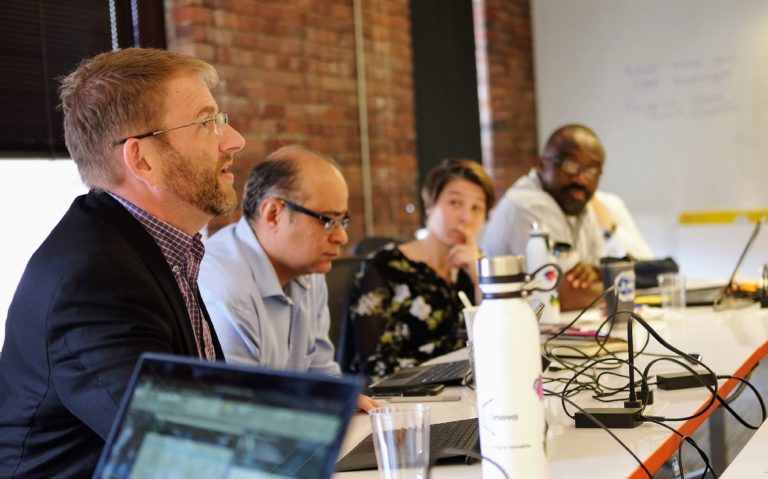
By James Thorne
Ask a room full of people how to fight malaria, and you’ll likely hear about bed nets, vaccines and healthcare infrastructure — all good answers. But there’s one critical piece of the puzzle that’s unlikely to spring to mind: logistics, or the tedious but essential task of tracking supplies in countries with basic infrastructure and low-tech tools.
The Bill & Melinda Gates Foundation wants to digitize Nigeria’s paper-based supply chain system in order to monitor malaria supplies in real time. To do that, they tapped Xinova, another Seattle-based organization that operates a network of thousands of experts and helps match their ideas with customers.
Xinova invited GeekWire to sit in on part of a two-day “rapid innovation session” for a glimpse into how the organization is trying to fulfill that tall order. We arrived on the second day after all the fun creative work of coming up with ideas was over and it was time to work through details.
The team of five experts included members of the Xinova network and outsiders who were recruited for the task. Collectively, they brought backgrounds in supply chain logistics, computer science, business development and politics. The members included:
- Chelsea Greene, a doctoral student in industrial and systems engineering at the University of Washington.
- Pourang Irani, a computer science professor at the University of Manitoba.
- Shawn Knowles, an independent advisor and consultant with a background in medical devices and consumer packaged goods.
- Keith Neroutsos, a supply chain consultant with a specialty in international health program procurements.
- Chris Rothfuss, the Senate Minority Leader at the Wyoming State Legislature.
Why this group? “You get a lot of different views and perspectives, and that helps you very quickly iterate between defining a problem and coming up with solutions,” said David Kraft, head of innovation services at Xinova, which spun out of Seattle-based Intellectual Ventures in 2016.
On the first day, the group of experts — or innovators, as Xinova calls them – sat down to throw ideas at the wall. They weren’t bogged down by details or concerns over what was or wasn’t feasible.
But on day two, all that creative energy was spent. In its place was a mountain of questions, concerns and details that stand in the way of any innovation.
The group’s goal was to improve the timeliness, quality and visibility of the supply chain — something that the old paper system had failed to do. But the group was also working with their proverbial hands tied behind their backs.
For starters, they were on the other side of the globe from Nigeria. They also needed a system that could work with Nigeria’s infrastructure, limiting them to data that can move over 2G networks. The solution would also have to be cheap and require minimal training. And there were some problems, such as theft and other human error, that no technological solution would overcome.
The Xinova team couldn’t recreate an Amazon warehouse. But there were other options, such as tags with QR codes or SMS-based reporting, that could gather real-time inventory data from a network of clinics.
As they dug into the nitty-gritty details, the size of the problem was never far from mind. Malaria is the leading cause of death in Nigeria and accounts for 26 percent of child mortality. Globally, malaria is the reason why mosquitos kill more people every year than any other animal.
For those reasons, the Gates Foundation last year pledged $1 billion through 2023 for malaria-related research and development projects.
Before the mid-day break, the group’s facilitator, Mike Manion, paused to look back on one of the ideas they had come up with. “I think it’s a really robust solution,” he said, sounding pleased.
At the end of the two-day session, there was still plenty of work ahead, and Xinova declined to share details about the solutions at this point. But the group had done what they came to do.
“You don’t necessarily know where it’s going to go. But after having run literally hundreds of these over my career, I’ve never been disappointed,” said Kraft. “There’s always some idea or perspective that gets shared that opens up a new window.”